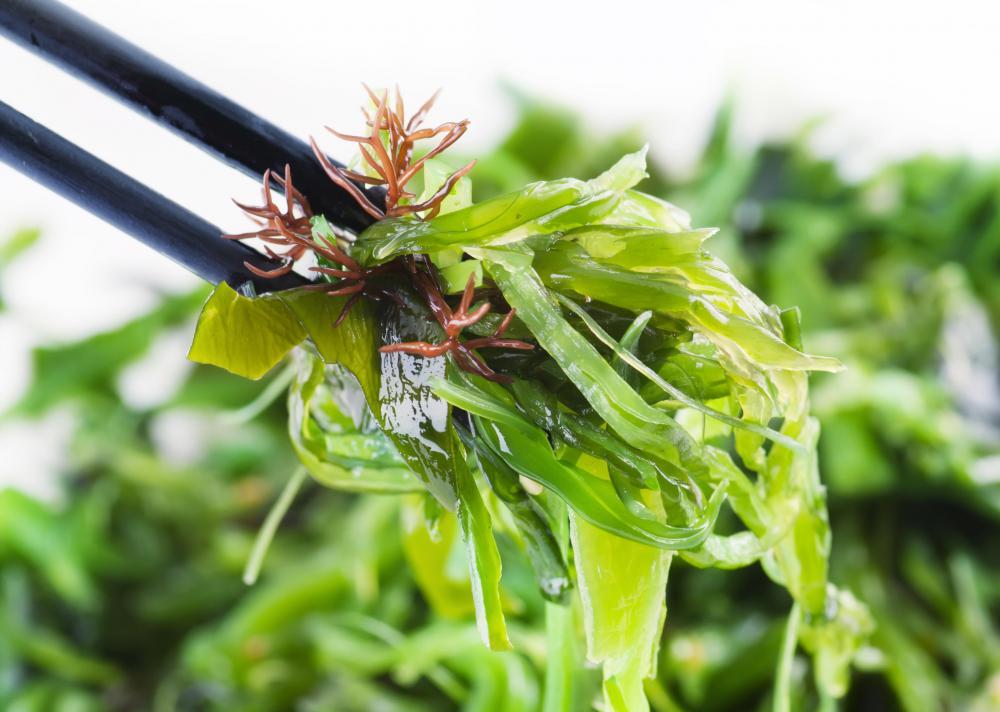At WiseGEEK, we're committed to delivering accurate, trustworthy information. Our expert-authored content is rigorously fact-checked and sourced from credible authorities. Discover how we uphold the highest standards in providing you with reliable knowledge.
Is There Iodine in Sea Salt?
Sea salt does have trace amounts of iodine, but it's not a good source of it. Iodine is also added to some table salts during processing, and occurs naturally in many foods. The recommended daily allowance for iodine is 150 micrograms and while most people easily meet or surpass this amount, individuals living in areas where this essential nutrient is lacking in soil and food may benefit from the iodine in sea salt.
In some parts of the world, iodine deficiency is due to a lack of this important mineral in soil. This deficiency leads to goiter, which is characterized by an enlarged thyroid gland. To avoid such conditions, experts recommend that individuals with low iodine levels take an iodine supplement, increase their intake of iodine-rich foods and use the iodine in iodized salt or sea salt as a food seasoning.

The amount of iodine in sea salt will vary, since it is not highly concentrated in this source. Studies suggest that a person with a low iodine level may not get enough of the mineral from sea salt alone to supplement her or his dietary needs. Iodized salt, however, tends to have higher levels of iodine in it than regular sea salt does. When ordinary table salt is originally processed, it is stripped of most of the natural minerals it contains. Before the process is completed, however, iodine is added to table salt, which may cause it to actually contain more of the mineral than sea salt does. Iodized sea salt, which has also been processed with added iodine, may also contain higher levels than plain sea salt.

Whether the mineral is gained via the iodine in sea salt or iodized salt, it is an extremely important part of the diet. Aside from low iodine causing goiter, it may also lead to hypothyroidism, which is a decline in thyroid hormone production. When this occurs, a person may experience such symptoms as elevated cholesterol, unintended weight gain, depression, pain throughout the body, leg swelling and constipation. Low iodine may also lead to intellectual deficiencies in children.

Neither the levels of iodine in sea salt nor the levels of the mineral present in iodized table salt are enough to be considered a complete iodine supplement. In order to maintain proper levels of the mineral, other foods high in iodine must also be consumed. Eating foods like certain dairy products, seafood and kelp may also help naturally increase iodine levels. These foods are only effective, however, if harvested from iodine-rich soil or sea water. Most people in the developed world can consume enough iodine simply by eating a balanced diet.
AS FEATURED ON:
AS FEATURED ON:














Discussion Comments
I think it is very dangerous to suggest no need for a doctor by recharging the thyroid with iodine. Iodine is not the only reason the thyroid barely functions or is overactive. My family and I all have thyroid problems and one of the members of my family had thyroid cancer. Please be careful in suggesting the above, as it could possibly cost someone their life by not seeing a medical professional when experiencing symptoms of thyroid deficiency, or overactive thyroid.
@ Parmnparsley- I doubt you will get goiter if you stop eating iodized salt since almost every processed American food has iodized salt as an ingredient. The American diet is also laced with seafood, and foods grown in fertile soils from around the world.
However, iodine deficiency is still a reality for almost 2 billion people worldwide, and it does cause billions of dollars in health care costs in certain landlocked industrialized nations. Goiter is a reality for many poor people in developing countries, and iodine deficiency is the number one cause of mental retardation in these developing nations. There are also ongoing studies that link iodine deficiency to breast cancer and gastro-intestinal problems. The mammary glands of mammals concentrate the body's iodine, allowing sufficient amounts to be passed on to breastfeeding young. In most cases, two iodine tablets per person, per year in these developing nations is all that is needed to prevent iodine deficiency related diseases.
@ Parmnparsley- Iodine is a rare earth element and is also the second heaviest biologically important element to humans. The element is a highly reactive halogen that is converted to important amino acids in the thyroid. The most abundant source of iodine is found in seawater. If you have ever noticed the slight blue tinge in shrimp, oysters, and other bottom feeders, this is attributed to the presence of iodine in their environment.
Most of the iodine that is used to fortify foods or in medicine however is mined in Chile. The iodine is semi stable at room temperature, transforming from a solid to a gas. The radioactive isotope of iodine is also one of the most carcinogenic radioactive isotopes there is. My guess is this is because of its importance in producing vital amino acids. The iodine is mixed into the salt in exact proportions to create iodized salt. Iodized salt in turn has significantly reduced the presence of goiter and mental retardation in industrialized nations. As for obtaining non-iodized salt, I'm sure you can find it, but unrefined sea salt naturally has iodine in it.
What exactly is iodine, and how do manufacturers incorporate it into sea salt and table salt? Will you get goiter if you stop eating iodized salt?
Post your comments